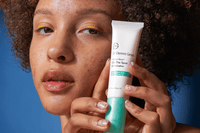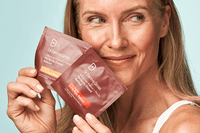When Should You Start Using Retinol?
5 minutes

Knowing all the benefits of using retinol (increased collagen production, decreased dark spots, etcetera), adding it to your regular skincare routine is a no-brainer. The only question is when.
Signs it’s time to start using retinol
The general recommendation for retinol is to begin using it in your mid-to-late 20s. That’s the age at which your natural collagen and elastin production starts to slow down, so it makes sense to try to make up the difference by incorporating an ingredient proven to boost those levels. However, some additional factors beyond your age can also influence your readiness for retinol.
You have thin skin
No, not emotionally. We mean skin that’s on the delicate side and not as thick as you might like. Without a collagen cushion to plump it up, thin skin tends to feature fine lines and wrinkles prominently. Luckily, retinol helps skin make collagen, which can fill out fine lines.
You’ve “taken the sun” in a major way
Perhaps youthful follies meant you bypassed applying SPF daily (no judgments). Or maybe your job meant spending hours and hours in the direct sun (working as a lifeguard, for example). Or your love of outdoor sports meant lots of perspiration and not a lot of sunscreen reapplication. Whatever the reason, excessive sun damage happens. Retinol is the remedy.
You have firsthand experience with cystic acne
If you had severe breakouts as a teen or in your early 20s, you may be left with lingering evidence (in the form of indentations and other textural issues) long after the acne has gone away. Over time, consistent retinol application can help skin make enough extra collagen to soften the look of indents and create a more even skin surface.
Top tips for becoming a retinol regular
Once you’re ready, here’s how to incorporate retinol into your skincare regimen to get the biggest bang for your buck.
Pace yourself
When it comes to retinol, it is a walk-before-you-run situation. The ingredient is highly stimulating to the skin, so it can often trigger irritation and redness when first applied. Therefore, you don’t want to dive in and begin by applying the maximum strength of retinol every night of the week. That will most certainly result in inflammation, which counteracts all of the collagen-building benefits that retinol provides. Instead, begin with a low dose one night a week and see how your skin reacts. You can gradually build up to a stronger amount applied more frequently as your skin’s tolerance develops.
Look for soothing supporting players
Yes, retinol can be irritating. But you don’t have to sit back and just accept it. Calming, soothing ingredients like ferulic acid, bakuchiol, and rambutan can help buffer the irritating effects of retinol when combined in the same formulation. As a result, you can get retinol’s benefits while lessening the chance of inflammation. You’ll find this trio in our new Advanced Retinol + Ferulic Perfectly Dosed Retinol Universal 0.2% and Advanced Retinol + Ferulic Perfectly Dosed Retinol Extra Strength 0.5% treatment pads, as well as in the entire Advanced Retinol + Ferulic collection.
Embrace SPF
UV rays destroy collagen; retinol builds collagen. If you use retinol without protecting the collagen you already have, you’re likely to net out at zero skin improvement. Table stakes are a minimum SPF of 30 applied daily. Our Dr. Dennis Gross All-Physical Lightweight Wrinkle Defense Broad Spectrum Sunscreen SPF 30 is an oil-free mineral formulation packed with antioxidants and easy to layer under makeup.
Discover Dr. Dennis Gross Skincare for All Your Skincare Needs
For more skincare tips from the experts at Dr. Dennis Gross, check out our blog’s newest content today. Shop the collection of Dr. Dennis Gross bestselling skincare backed by dermatologists.

Written By
Ben Gentzler
Ben Gentzler ha trabajado en la industria de la belleza durante 17 años, 10 de los cuales se dedicaron al cuidado clínico de la piel. Es un esteticista licenciado apasionado por la educación profesional líder en tratamientos de vanguardia en los mejores spas de todo el mundo y por la formación en la ciencia de la piel. Ben se ha capacitado directamente con el Dr. Dennis Gross, aprendiendo sobre lo último en cuidado de la piel y trabajando con sus clientes para ayudarlos a lograr su mejor piel.
Read More from Ben Gentzler
Written By
Ben Gentzler
Ben Gentzler ha trabajado en la industria de la belleza durante 17 años, 10 de los cuales se dedicaron al cuidado clínico de la piel. Es un esteticista licenciado apasionado por la educación profesional líder en tratamientos de vanguardia en los mejores spas de todo el mundo y por la formación en la ciencia de la piel. Ben se ha capacitado directamente con el Dr. Dennis Gross, aprendiendo sobre lo último en cuidado de la piel y trabajando con sus clientes para ayudarlos a lograr su mejor piel.
Read More from Ben GentzlerRelated Articles
-

acne, author-ben-gentzler, skin-and-deeper April 03, 2024 — 6 minutes
Hit It: Introducing The Dr. Dennis Gross Alpha Beta On The Spot Eliminator
by Ben Gentzler
-

author-ben-gentzler, myth-busting, oily-skin, skin-and-deeper April 01, 2024 — 9 minutes
Myth busted: Yes, your oily skin does need a moisturizer
by Ben Gentzler
-

author-ben-gentzler, pro-tips, retinol, skin-and-deeper March 25, 2024 — 5 minutes
How to Use Perfectly Dosed Retinol Pads Like a Pro
by Ben Gentzler
Keep Reading
Mantente al día con los últimos consejos de nuestro equipo de expertos en cuidado de la piel.
Regístrese para recibir un resumen mensual de consejos para el cuidado de la piel, el bienestar y el estilo de vida.






